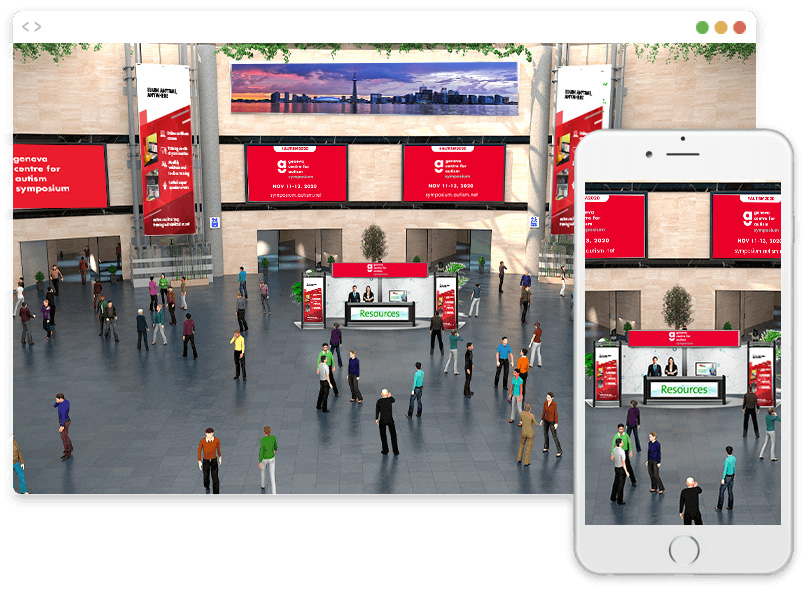How to Select the Right Platform for Your Virtual Event
You’ll need to use a dedicated and reliable virtual event platform to ensure your next online event is the talk of the town, but with so many available on the market, how do you decide which to use?
Here are seven questions you need to answer to find the best virtual event platform for your needs.
1. How Easy Is It to Use?
Sitting with tutorials and how-to guides just days before the event isn’t an option. So, if you or your team are planning to manage the event software yourself, you need to consider how easy it is to use.
Generally, the easier-to-use drag and drop style platforms tend to have fewer features, so you must weigh up the importance of certain features against ease of use. If you require more advanced features, you’ll need to consider hiring professionals to help operate the platform.
Besides the logistics of running the platform, you need to think about your attendees’ experience more importantly. The user experience should be as effortless as possible, from logging onto the platform to accessing the various features available at your event. You also want to ensure the process is simple for your speakers and presenters. Look for a clean and intuitive user interface.
2. Can You Customize Elements?
The platform you choose must have plenty of customization options. After all, your event is unique.
It should be commonplace for most platforms, but you need to ensure that it has appropriate branding options. One of the most critical aspects of your virtual event is to strengthen your brand awareness. So ensure you can customize all aspects associated with your brand, from the registration page to event rooms.
Not all platforms are equal when it comes to industry requirements, so be sure to ask how the platform caters to your particular needs. For instance, a conference may need the ability to host concurrent sessions, or perhaps your event requires one-to-one networking and exhibitor booths.
3. Does It Support Live Content Delivery?
Most conferences require live-streaming capabilities for seminars, product launches, and corporate announcements, but do not underestimate the use of pre-recorded content. Live broadcasts may come with more interaction, but pre-recorded content allows you to produce more refined and professionally edited content.
The platform you use needs to have playback functionality too. All your content, live and pre-recorded, should be accessible at all times throughout the event. This will improve their overall engagement and longevity.
Content Delivery Networks (CDN) that help minimize the delay in loading online content are increasingly becoming the norm. You may need a dedicated one if you’re planning to invite a large number of guests.
4. Does It Offer Audience Engagement Tools?
It might seem obvious, but it cannot be understated, user engagement is one of your highest priorities. Yes, Zoom Fatigue is now a real thing.
Your attendees should not only be able to interact with the event but with one another. Throwing in a few polls, Q&A sessions, and chatrooms make the conversation interesting for both guests and panelists. These tools can help break the ice and ensure more participation in future sessions.
Consider what is necessary for your event, as too many interactivity tools can be counterproductive and distracting.
5. Can You Engage Sponsors & Exhibitors?
When it comes to virtual events, sponsors might have their apprehensions about visibility. You can gain their confidence by using the right kind of tools.
The ideal platform should accommodate web banners, virtual stalls and provide CTA options for sponsors’ products. Having software that collects information such as duration of banner, engagement rate, and CTR will help you attract more sponsors.
6. Does It Offer Integration Capabilities?
While conducting a virtual event platform comparison, factoring in integration capabilities is essential. It helps reduce the hassle of data transfer and makes your event a glitch-free affair.
Whether it’s your ticketing portal, an external form, or the event’s official app, the integration should happen seamlessly.
7. Will You Have Access to Data Management & Analytics?
Check with your virtual event software providers if they provide analytical capabilities.
This is the part where you can leverage the power of online events. Unlike traditional setups, you can get more information about your audience and sessions.
Time spent in a session, number of interactions, and other demographic indicators are precious. Gathering these data points will help you make informed decisions for future events. So, the next time around, you’ll be able to target the right audience, panelists, and sponsors.
Start Shopping for Your Platform
Keep these questions in mind and get started with your hunt, but remember, finding the best virtual event platform is only one small part of putting on an event. From strategy development to project planning and marketing communications, you have a tough road ahead.
If you need help with your next virtual event, the Royal Blue Events Management team can guide you through every integral step.
Author: Frederick Nielsen







